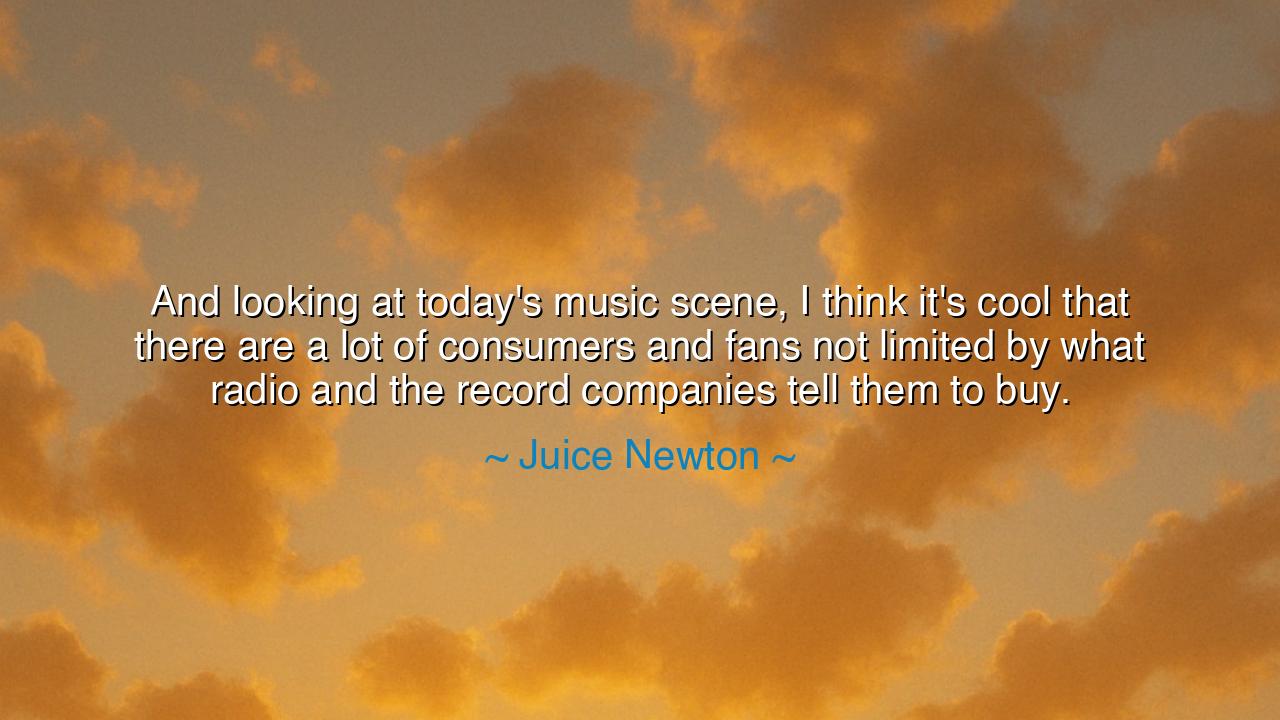
And looking at today's music scene, I think it's cool that there
And looking at today's music scene, I think it's cool that there are a lot of consumers and fans not limited by what radio and the record companies tell them to buy.






In the ebb and flow of human history, the voice of the people has always found ways to rise above the constraints imposed by power, tradition, and authority. Juice Newton's words, "And looking at today's music scene, I think it's cool that there are a lot of consumers and fans not limited by what radio and the record companies tell them to buy," reflect a profound shift in the ways individuals engage with culture. Music, like all forms of expression, has long been subject to the control of those who dictate what is popular, what is worthy, and what is valued. Yet, as Newton celebrates, we now find ourselves in an age where the consumer—the listener, the fan—has the freedom to choose and shape their musical experience, unhindered by the traditional gatekeepers of the industry.
This is not a new phenomenon, but rather the continuation of a tradition that stretches back to the very dawn of civilization. In ancient times, art—whether it be music, painting, or literature—was often controlled by the elite: the ruling class, the religious authorities, or the monarchs. Consider the great philosophers of Greece, such as Socrates, who found themselves in conflict with the established authorities because they dared to challenge the dominant narratives of their time. Just as Socrates questioned the wisdom of the gods and the authority of the city, so too do today's artists and fans challenge the narratives set by the powers that be. The essence of freedom lies in the ability to express and consume culture without being told what is worthy of attention.
Take, for example, the rise of the printing press in the 15th century, which allowed for the widespread dissemination of ideas and the democratization of knowledge. Before this invention, books were scarce and expensive, often controlled by religious institutions or the aristocracy. Yet, as the press spread across Europe, it enabled individuals to access a wider array of thought and art. This democratization of knowledge shifted the power away from the elite and into the hands of the people, allowing for a cultural revolution. Much like the way music has evolved today, individuals began to choose what ideas, books, and ultimately what music, they wished to engage with, free from the constraint of authority.
In the modern age, the internet and digital platforms have transformed the landscape of music and culture in ways that even the ancients could scarcely imagine. Today, listeners are no longer at the mercy of radio stations or record labels that dictate what is "popular." Platforms like Spotify, YouTube, and SoundCloud have given rise to a new form of cultural independence, where the consumer is empowered to explore a vast ocean of music from all corners of the world. Just as the Greeks and Romans once embraced new ideas from the far reaches of the known world, today’s music consumers have access to an endless variety of genres, styles, and voices. They are no longer limited by geography, class, or the influence of a few powerful gatekeepers.
This shift, as Juice Newton recognizes, is a revolutionary moment in the history of music. But it is not just about music—it is about the very nature of freedom and expression in society. The control once held by a few powerful forces—be it monarchs, religious leaders, or corporations—has given way to a new kind of empowerment, where the individual is free to choose their own path. In this way, music mirrors the greater social movements of history, from the Renaissance to the Enlightenment, where new voices and ideas were allowed to flourish without restriction. Just as the artists of the Renaissance, like Michelangelo and Da Vinci, broke free from the constraints of the church, so too do today’s musicians break free from the constraints of the corporate world.
The lesson here is clear: freedom—in both the creation and consumption of culture—is a powerful force that can transform society. When we are no longer bound by the limits set by the few but instead empowered to seek out our own truths, we find that expression becomes more vibrant, more diverse, and more inclusive. The role of the artist and the consumer is no longer passive; it is active, engaged, and free.
So let us take this lesson forward into our own lives. We must remember that freedom of thought, expression, and consumption is something that needs to be nurtured and protected. As individuals, we must choose not to accept the dictates of those who seek to limit us but instead explore the world with open hearts and minds, selecting what we believe will nourish our souls. Just as Socrates questioned the limits of knowledge, so too must we question the boundaries of culture and the forces that seek to control it. By doing so, we honor not just the past, but the future, ensuring that creativity and expression remain free for generations to come.






AAdministratorAdministrator
Welcome, honored guests. Please leave a comment, we will respond soon